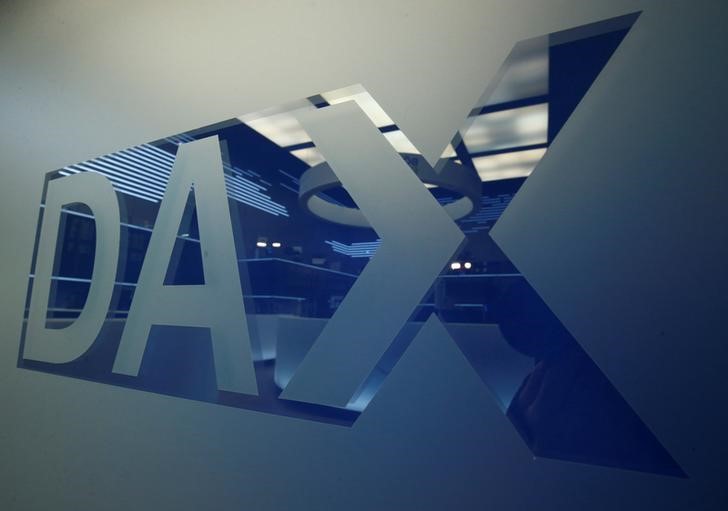IREN proposes $875 million convertible notes offering due 2031
Investing.com - European stock markets mostly fell Thursday ahead of a key European Central Bank meeting, handing back early gains as weak retail sales data pointed to regional economic weakness.
At 06:10 ET (11:10 GMT), the DAX index in Germany traded largely flat, while the CAC 40 in France fell 0.7% and the FTSE 100 in the UK slipped 1.2%.
ECB set to cut
The main investors focus Thursday will be on the ECB meeting, with the central bank widely expected to cut interest rates again as policymakers contend with trade war woes and a rearmament focus in the region.
The ECB has cut borrowing costs rapidly over the past nine months as inflation retreated and economic growth faltered, reducing rates five times since June, and has telegraphed another 25 basis point reduction in the deposit rate later in the session, taking it to 2.5%.
An illustration of the difficult economic times came earlier Thursday with the release of data showing eurozone retail sales unexpectedly dipped in January, adding to signs that a long-predicted consumption-led recovery is not yet on the horizon.
Retail sales in the 20 nations sharing the euro currency dipped by 0.3% on the month, confounding expectations for a 0.1% rise, as non-food products and fuel sales both fell.
It was the fourth straight month of contraction or zero growth, and retail figures have been trending down for the past half year.
Given an interest rate cut is broadly priced in, investors are likely to focus on the comments from ECB President Christine Lagarde for guidance amid uncertainty over the global economic outlook.
A trade war with the United States is looming, while both Germany and the European Commission have announced changes in fiscal rules to boost defence and infrastructure spending - a move that could impact growth for years.
Goldman Sachs raised its economic growth forecast for Germany this year, citing in a note the prospect of increased military and infrastructure spending, and also upgraded the growth estimate for the broader euro area.
The U.S. investment bank now expects 0.2% growth for Europe’s largest economy, up from a flat figure, while the euro area’s growth is set to increase by 0.8%, up from the previously forecast 0.7%.
Easing trade tensions?
Sentiment had been boosted after the White House announced late on Wednesday a one-month exemption from the newly imposed 25% tariffs on vehicle imports from Mexico and Canada.
A Bloomberg report also showed that U.S. President Donald Trump is planning to exempt certain agricultural products from the tariffs imposed on Canada and Mexico.
Elsewhere, European leaders are meeting in Brussels for a special summit on defense as the region tries to maintain its support for Ukraine, in the wake of the U.S. pausing sending military aid to Kyiv.
Lufthansa soars on record revenues
In the corporate sector, Lufthansa (ETR:LHAG) stock soared 8% after the German carrier reported record revenues, even as its full-year operating profit declined in 2024, citing a combination of strikes, rising costs, and delays in aircraft deliveries.
Air France KLM (EPA:AIRF) stock surged 21% reported better than expected annual results, citing reduced costs and a strong fourth quarter performance while its Dutch unit flagged ongoing pressures on profitability.
Merck KGaA (ETR:MRCG) stock rose 1.6% said it anticipates solid results in 2025, with the German science and technology company projecting forex-adjusted earnings growth of up to 8%, driven by organic sales expansion across its business sectors.
Melrose Industries (LON:MRON) stock fell 12% after the aerospace parts supplier forecast 2025 revenue below most expectations, as global trade uncertainties and industry-wide supply chain challenges persist.
Deutsche Bank (ETR:DBKGn) stock rose 3%, bringing the gains for Germany’s biggest lender to around 15% in the two days since German political parties agreed a major spending shift to revamp the military and revive growth.
Crude prices bounce from multi-year lows
Oil prices edged higher Thursday, bouncing from multi-year lows as traders fretted over trade war worries and a rising supply.
By 06:10 ET, the US crude futures (WTI) climbed 0.1% to $66.37 a barrel, while the Brent contract rose 0.1% to $69.33 a barrel.
Brent plunged 6.5% in the previous four sessions, dropping to its lowest since December 2021 on Wednesday, while WTI fell 5.8% over the same period to its lowest since May 2023.
Prices fell after the U.S. enacted tariffs on Canadian and Mexican goods, including energy imports, at the same time major producers decided to raise output quotas for the first time since 2022.
